Select Language
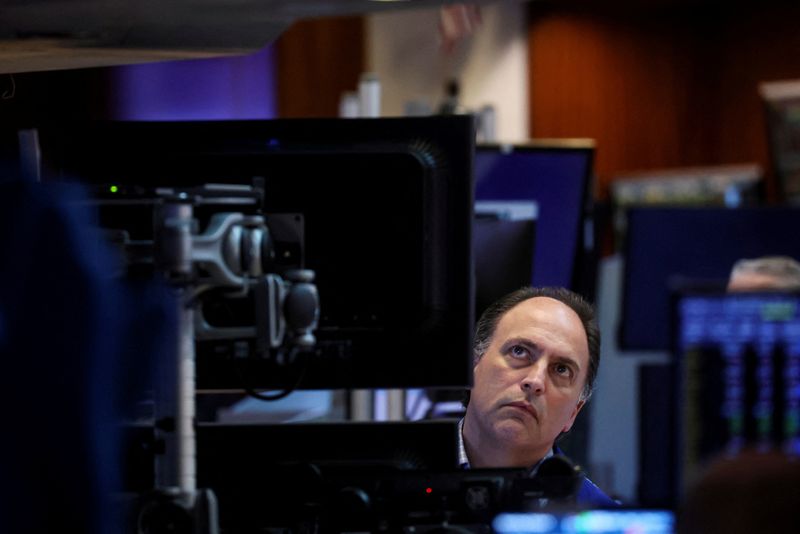
Investing.com -- The Federal Reserve is to publish the minutes of its latest meeting and several Fed officials are to deliver remarks as renewed expectations for rate cuts power markets higher. AI darling Nvidia (NASDAQ:NVDA) is to report earnings, PMI releases will give insights into the health of the global economy, while the U.K. is to release what will be closely watched inflation data and the Reserve Bank of New Zealand meets. Here’s what you need to know to start your week.
Fed minutes, speakers
On Wednesday the Fed is due to publish the minutes of its April 30-May 1 meeting, when Fed Chair Jerome Powell indicated that rates are likely to remain higher for longer amid lingering inflation pressures.
Since then, a report last week showed that U.S. consumer prices increased less than expected in April, indicating that inflation resumed its downward trend at the start of the second quarter.
Several Fed officials are also due to speak during the week, including Atlanta Fed President Raphael Bostic, Governors Michael Barr, Christopher Waller and Philip Jefferson, Cleveland Fed President Loretta Mester, New York Fed President John Williams and Richmond Fed President Thomas Barkin.
The economic calendar also includes reports on new and existing home sales, durable goods orders and consumer sentiment.
Nvidia earnings
Nvidia's quarterly results on Wednesday could set the tone for U.S. stock markets and reverberate through companies exposed to the burgeoning artificial intelligence field.
The semiconductor company at the centre of the excitement over AI's business potential is expected to report a massive jump in revenue and profit for its fiscal first quarter.
Revenue is expected to rise to $24.8 billion, from $7.2 billion a year earlier, with earnings per share soaring to $5.57 from $1.09, according to LSEG data cited by Reuters.
Nvidia may need to meet those lofty expectations and then some to keep its soaring stock price moving higher. Shares have jumped over 90% this year after more than tripling in 2023, making the AI darling the third-largest U.S. company by market value.
PMI data
The U.S., China, the euro zone and the U.K. are all to release May PMI data that should reinforce a brighter global economic outlook.
A slow euro area recovery appears to be underway after six straight quarters of stagnant or negative growth, U.S. inflation just resumed its downward trend and China grew faster than expected in the first quarter.
So, global PMIs should stay on the right side of the line between expansion and contraction.
Yet steep U.S. tariff increases on Chinese imports from electric vehicle batteries to computer chips highlight a fragile outlook for global trade and growth. China has vowed retaliation.
Manufacturers in Germany, Europe's biggest economy, are already experiencing shifts in world trade and geopolitics. Heightened trade tensions - with a U.S. election looming - could hurt them further, upend China's recovery and reignite U.S. inflation.
U.K. inflation data
The U.K. is to publish April CPI data on Wednesday with economists expecting the annual rate of inflation to have slowed dramatically - by more than a percentage point - to near the 2% level targeted by the Bank of England.
There is one more inflation report due out ahead of the next BoE meeting on June 20 and sustained evidence of cooling price pressures could give officials all the encouragement they need to cut interest rates.
Ahead of the inflation numbers BoE Governor Andrew Baily is due to deliver remarks on Tuesday.
The U.K. economic calendar also features April retail sales data on Friday.
RBNZ decision
The Reserve Bank of New Zealand is expected to leave rates unchanged on Wednesday for a seventh straight meeting, against a background of persistent inflation and a stalling economy.
The RBNZ was the first major central bank to ease at the start of the pandemic, and the first to hike in the aftermath.
Market bets for an eventual rate cut in October put it behind the European Central Bank which is expected to move in June, followed by the BoE in August and the Fed in September. Switzerland and Sweden have started easing.
The RBNZ itself is even less optimistic, projecting no rate cuts until next year.
--Reuters contributed to this report
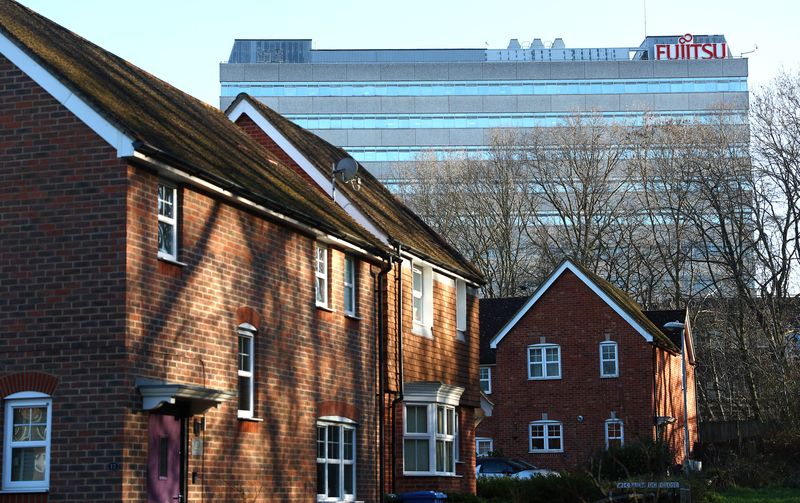
LONDON (Reuters) - Prices of homes being put up for sale in Britain have hit record highs despite still expensive mortgage costs, but the pace of gains has slowed, according to data from property website Rightmove (OTC:RTMVY).
The average asking price for residential properties touched 375,131 pounds ($474,578.23) in the four weeks to mid-May, Rightmove said.
However, the 0.8% increase in month-on-month terms represented the weakest rise so far in 2024.
Prices were only 0.6% higher when compared with the same period last year.
Britain's housing market slowed last year as higher borrowing costs weighed on the market but it has shown signs of picking up in recent months as falling inflation boosts household incomes and raises the prospect of interest rate cuts.
Tim Bannister, Rightmove's director of property science, said the momentum of the spring selling season was not a sign of a return to strong demand.
"The market remains price-sensitive, and with prices reaching new records in the majority of regions and mortgage rates remaining elevated, affordability for many home-buyers is still stretched," Bannister said.
Rightmove said asking prices rose by the most - up 1.3% in annual terms - in the high end of the market.
($1 = 0.7905 pounds)
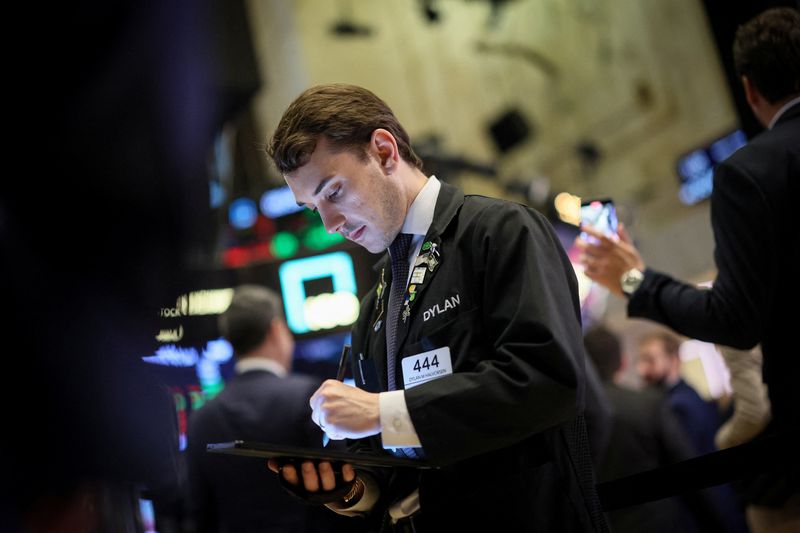
LONDON (Reuters) - Investors poured money into stocks and bonds in the week to Wednesday, favouring laggards such as utilities, but pulling money from pricier parts of the market such as technology stocks, BofA research showed on Friday.
Equity funds saw $11.9 billion in inflows, while bond funds drew in $11.7 billion, BofA said citing data from EPFR.
Within fixed income, Treasury inflation-protected securities (TIPS) saw outflows of $700 million, the most in nine weeks.
Data on Wednesday showed U.S. consumer inflation moderated in line with expectations in April, offering investors confidence that a recent pickup in fuel prices has not translated into an overall rise in consumer price pressures that could delay much-anticipated rate cuts.
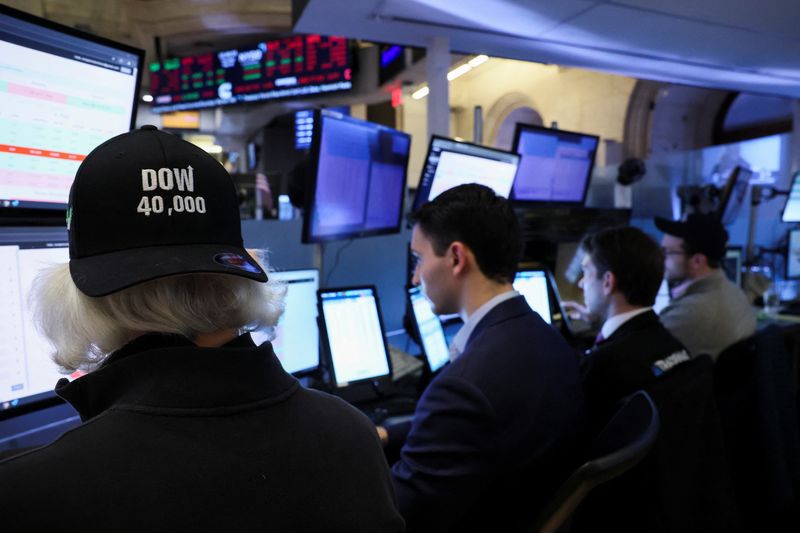
By Saqib Iqbal Ahmed and Lewis Krauskopf
NEW YORK (Reuters) - The Dow Jones Industrial Average, a laggard among the major U.S. stock indexes this year, got its moment in the spotlight on Thursday as it briefly broke above 40,000 points for the first time in its history.
The record on the Dow - as well as fresh records on the S&P 500 and Nasdaq Composite earlier this week - come as investors grow more confident that the U.S. is heading for an economic soft landing, where the Federal Reserve is able to tame inflation without badly hurting growth.
A stronger-than-expected earnings season has also helped propel stocks higher, with 77% of companies beating estimates, compared to 67% historically, according to LSEG IBES data as of May 10.
While Dow components are weighted in the index by their share prices, S&P 500 stocks are weighted largely by their market value. The relatively infrequent changes to the Dow means it sometimes may be slower to include some of the hottest companies.
Some $89 billion in assets is benchmarked to the Dow, compared to $11.45 trillion pegged to the S&P 500, according to the S&P Dow Jones Indices annual survey of assets as of December 2023.
Still, the price-weighted index retains cultural cache: established in 1896, it is far older than the S&P 500, which was launched in 1957 and the Nasdaq, which was launched in 1971. The Dow outperformed the S&P 500 in eight of the last 20 years. This year, it is up 5.8%, compared to the S&P 500's 11.1% year-to-date gain and the Nasdaq's 11.2% rise.
"The Dow is America's index," said Quincy Krosby, chief global strategist at LPL Financial (NASDAQ:LPLA). "It has been slighted by the professionals, but the Dow is enduring and it represents Main Street America,"
The index closed at 39,869.38 on Thursday after reversing in afternoon trading.
Past 10,000-level milestones in the Dow have been followed by accelerated gains in the index, though market participants say it is difficult to pinpoint a reason for the momentum.
The Dow has notched an average gain of 4.3% in the month after crossing a 10,000 point milestone. That's well above the index's average rolling one-month gain of 0.57% since May 1896.
"Breaking the 40,000 barrier is a big psychological boost for the bulls as round numbers hold special significance in people's hearts and minds," Chris Zaccarelli, chief investment officer at Independent Advisor Alliance said in a note.
The most recent milestone comes a little more than three years after the index hit 30,000 points, a period marked by big market swings as investors grappled with the aftermath of the COVID-19 pandemic, surging inflation and the interest rate increases by the Fed to combat rising consumer prices.
The composition of the Dow can contrast markedly from that of the S&P 500 due to the different methods by which the indexes select and weight their constituents.
For example, the top weight in the Dow as of Wednesday's close, UnitedHealth Group (NYSE:UNH), is only the 13th most heavily weighted stock in the S&P 500. The Dow's second-biggest weighting, Goldman Sachs, does not make the S&P 500's top 50.
By contrast, three of the top six weights in the S&P 500 - Nvidia (NASDAQ:NVDA), Alphabet (NASDAQ:GOOGL) and Meta Platforms (NASDAQ:META) - are not in the Dow.
The Dow's journey from 30,000 to 40,000 points has been marked by a wide gap between the index's best and worst performing stocks. Top performers include American Express (NYSE:AXP), Caterpillar (NYSE:CAT) and Microsoft (NASDAQ:MSFT), whose shares have all roughly doubled in value since November 2020, when the Dow first touched 30,000.
Bringing up the rear are Verizon (NYSE:VZ), Nike (NYSE:NKE) and Intel (NASDAQ:INTC), which have shed around a third of their value over that period.

BEIJING (Reuters) - China's new home prices fell at the fastest monthly pace in over nine years in April, keeping pressure on authorities as intensified efforts to prop up the ailing property sector show few signs of paying off.
Prices were down 0.6% month-on-month in April, worse than a 0.3% fall in March, the fastest pace since November 2014, according to Reuters calculations based on National Bureau of Statistics (NBS) data released on Friday. Prices have fallen for a tenth consecutive month, the data showed.
In annual terms, new home prices fell at the steepest pace since July 2015, down 3.1% last month versus a 2.2% drop in March.
Chinese authorities have stepped up efforts since 2022 to revive the ailing property sector, which is a major driver of the world's second-biggest economy, but a meaningful recovery has proven elusive.
Authorities last month vowed at a Politburo meeting to improve policies to clear mounting housing inventory. In the latest attempt, policymakers are considering a proposal for local governments nationwide to purchase millions of unsold homes, Bloomberg News reported earlier this week.
Last week, two Chinese provincial capitals - Hangzhou and Xian - lifted all home purchase curbs to attract buyers and shore up their sagging property markets, with investors expecting more megacities to follow suit.
It's anybody's guess if the latest steps would help foster a meaningful recovery in the sector which plunged into crisis in 2021 amid a massive liquidity squeeze following an official crackdown on bad debt.
Many China observers believe a broad sector revival would require policy support measures to go hand in hand with structural reforms
Of the 70 cities in the housing data, 64 reported declines in prices last month, more than the 57 cities that did so in March.
A separate statement from NBS showed property investment and sales both fell at a faster pace from a year earlier in January-April.
(This story has been refiled to correct the day of the week in paragraph 2)
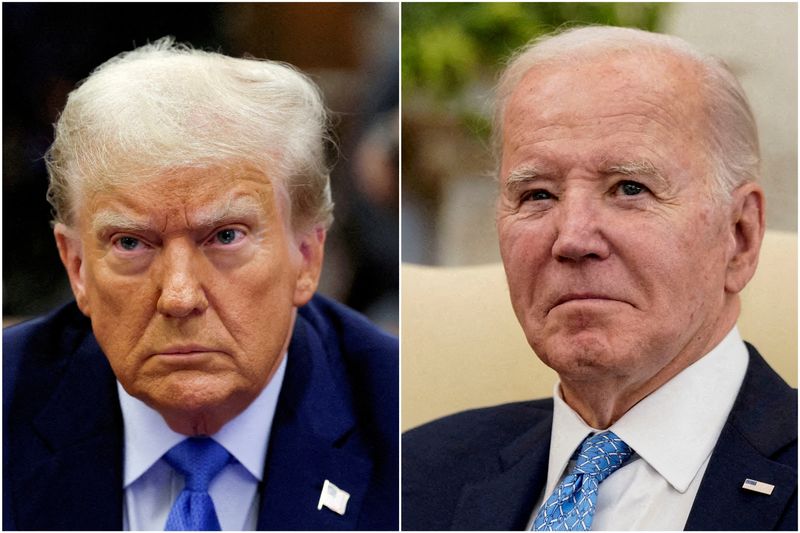
WASHINGTON (Reuters) - The Dow topped 40,000 for the first time on Thursday in an all-time high, giving U.S. President Joe Biden an opening to prove his Republican election rival's 2020 predictions wrong.
The state of the U.S. economy looms as one of the larger factors weighing on the Democratic president's bid for reelection. Persistently high prices have hindered Biden's efforts to win credit from voters for his handling of the economy, although inflation in recent months has been easing.
"Good one, Donald," Biden said in a post on X hours after the blue-chip index made its gains.
In an accompanying video, a split screen shows Donald Trump campaigning in the 2020 presidential election he lost to the Democrat.
"If Biden wins, you're going to have a stock market collapse the likes of which you've never had," Trump says in the video clip.
The top half of the screen shows the year 2024 and images of Biden and Vice President Kamala Harris, with commentary from an array of business television newscasters on the 40,000 breach.
"The Dow 30 broke 40,000 for the first time in history," one broadcaster says.
"Look at that market!" exclaims a second.
"We see earnings increasing for the second quarter. We see record earnings estimates for the third and fourth quarter and that's what really impresses me," another intones.
The video ends with Fox Business Network's Stuart Varney saying, "I've been doing this a long time. I never expected the Dow to hit 40,000."
The Trump campaign did not immediately respond to a request for comment.
Biden has struggled to convince voters of the efficacy of his economic policies despite a backdrop of low unemployment and above-trend economic growth. A Reuters/Ipsos poll last month showed Trump had a 7 percentage-point edge over Biden on the economy.
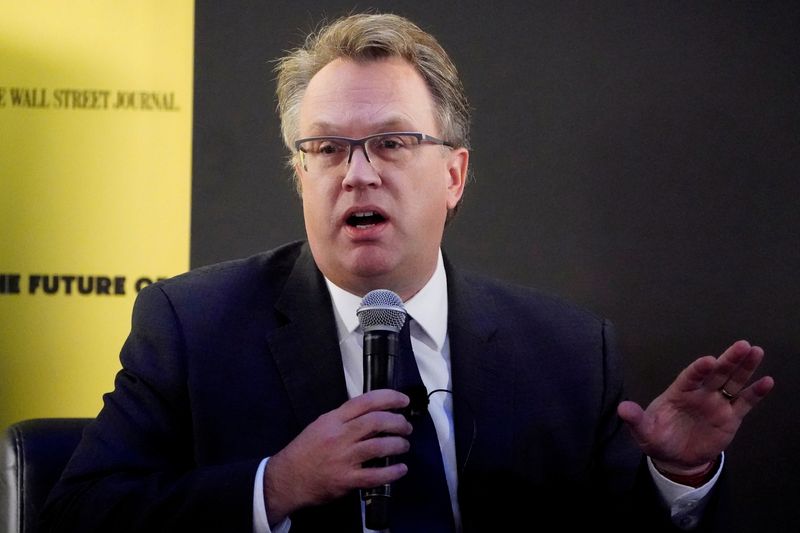
Investing.com - The latest consumer inflation data has been broadly well received by financial markets, but Federal Reserve Bank of New York President John Williams said this news, while positive, is not sufficient for the U.S. central bank to cut interest rates sometime soon.
Data released on Wednesday showed that U.S. consumer price growth had slowed as anticipated to 3.4% on an annualized basis in April, while so-called ‘core’ CPI, which excludes volatile energy and food prices, increased 3.6% annually, the smallest year-on-year gain since April 2021.
The softer inflation tone is "kind of a positive development after a few months where the data were disappointing," Williams said in an interview with Reuters on Wednesday, and "the overall trend looks reasonably good."
However, he is still not sufficiently confident that price pressures are moving sustainably to the Fed's 2% inflation target before lowering short-term borrowing costs.
Monetary policy is "restrictive" and "is in a good place," Williams said. "I don't see any indicators now telling me ... there's a reason to change the stance of monetary policy now, and I don't expect that, I don't expect to get that greater confidence that we need to see on inflation progress towards a 2% goal in the very near term."
Still, Williams also stated that he couldn’t see “any need to tighten monetary policy today," largely ending any speculation that the Fed might need to raise rates further to reduce inflation to desired levels.
Williams is one of the most respected voices at the central bank, and also serves as vice-chairman of the rate-setting Federal Open Market Committee.
He had said earlier this month that the U.S. central bank will lower its interest rate target at some undefined point.
"Eventually we'll have rate cuts" but for now monetary policy is in a "very good place," Williams said in comments made before the Milken Institute 2024 Global Conference in Beverly Hills, California.
The Federal Open Market Committee maintained the overnight target at between 5.25% and 5.5% at its last meeting at the start of this month.
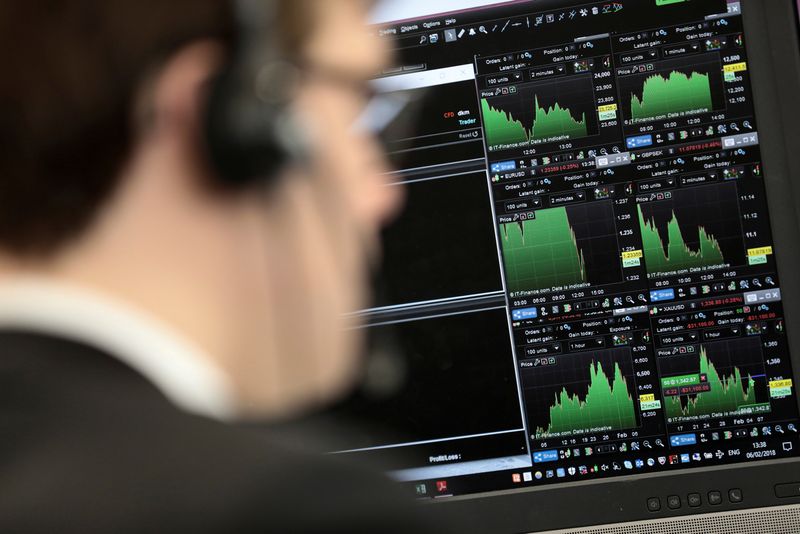
Investing.com -- Wall Street futures traded largely unchanged ahead of the release of the key monthly consumer price report, which could guide future Federal Reserve thinking. Cisco (NASDAQ:CSCO)'s results are due after the close, while the meme stock rally continued apace.
1. U.S. CPI looms large
The release of the crucial monthly U.S. consumer price report is the main event Wednesday, as it’s likely to influence the Federal Reserve's near-term policy path.
April’s consumer price index is due out during the U.S. trading morning, and economists expect that it rose 0.4% in April on a month-over-month basis, or 3.4% from 12 months earlier.
The core reading, which excludes volatile food and energy prices, is expected to show underlying inflation rising 3.6% on a year-over-year basis, which would be the smallest increase in over three years, a monthly rise of 0.3%.
Investors have had to dial back their expectations of U.S. rate cuts this year due to sticky inflation and are now pricing in 43 basis points of easing this year, compared with 150 bps of easing anticipated at the start of 2024.
Federal Reserve Chair Jerome Powell emphasised the point that inflation was proving difficult to tame in a speech at the Foreign Bankers' Association's Annual General Meeting in Amsterdam on Tuesday.
"Inflation in Q1 was notable for the lack of further progress," Powell said. "Confidence in inflation moving back down is lower than it was. My confidence on that is not as high as it was before."
U.S. producer prices increased more than expected in April, data showed on Tuesday, indicating that inflation remained stubbornly high early in the second quarter.
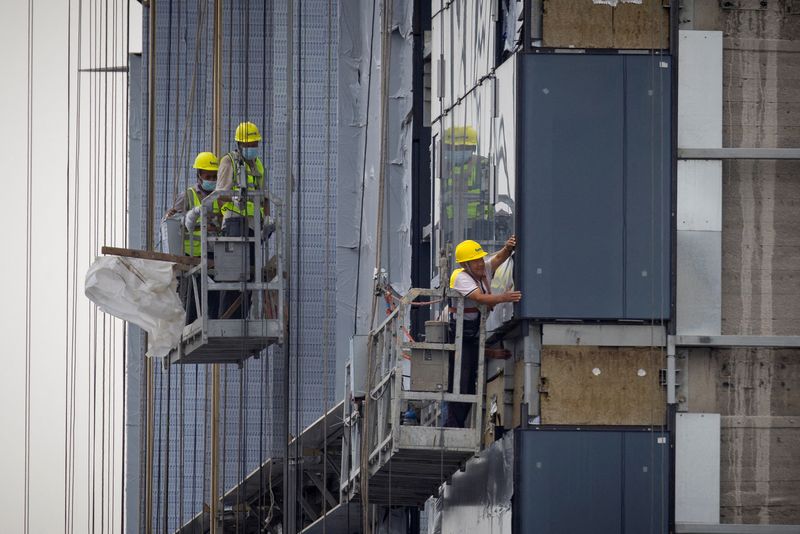
By Clare Jim
HONG KONG (Reuters) -Shares of Chinese property developers jumped on Thursday, after a report that China is considering a plan for local governments nationwide to buy millions of unsold homes from distressed companies to ease a protracted property crisis.
Hong Kong's Hang Seng Mainland Properties Index firmed as much as 6% in morning trading.
State-backed Sino-Ocean Group surged more than 50% and defaulted private developers CIFI Holdings and Shimao Group jumped more than 30%.
Hong Kong's markets were closed on Wednesday for a public holiday. They have been catching up to gains in mainland property shares since the previous day.
China's CSI 300 Real Estate index climbed over 3% on Thursday, following a 2.2% rise on Wednesday.
Bloomberg News said on Wednesday the State Council is gathering feedback on the preliminary plan from various provinces and government bodies, after a meeting of the ruling Communist Party leaders in late April called for efforts to clear mounting housing inventory.
Local state-owned enterprises would be asked to help purchase unsold homes from distressed developers at steep discounts using loans provided by state banks, according to the report, which added that many of these homes would be converted into affordable housing.
China's property sector slipped into a debt crisis in mid-2021. Since 2022, waves of policy measures have failed to turn around the sector that represents around a fifth of the economy and remains a major drag on consumer spending and confidence.
POLICY RAMP-UP
Over the past years, some local governments have already announced plans to buy unfinished or unsold homes from developers and turn them into social housing.

By David Shepardson
WASHINGTON (Reuters) -The U.S. Transportation Department said Wednesday it had fined Mexican carrier Volaris Airlines up to $300,000 for violating federal law on airport tarmac delays.
Federal law and government regulations prohibit tarmac delays of four hours or more on international flights without providing passengers an opportunity to deplane.
The department said in 2021 and 2022, Volaris allowed two flights to remain on the tarmac for lengthy periods without providing passengers an opportunity to deplane in Houston and St. Louis. Volaris will pay $150,000 of the fine and must pay the other $150,000 fine if it violates the tarmac rules within a year. The U.S. Department of Transportation (USDOT) has issued a number of similar fines to other carriers in recent years.
Volaris, which did not immediately respond to a request for comment, agreed to the penalty and told USDOT a series of events outside of its control combined to cause the tarmac delays and said it takes the rules seriously.
"This enforcement action reflects our ongoing commitment to protecting consumers and holding airlines accountable," Transportation Secretary Pete Buttigieg said in a statement.
USDOT in January 2023 said it planned to seek higher penalties from airlines and others that broke consumer protection rules, saying they were necessary to deter future violations.
In August, it fined American Airlines (NASDAQ:AAL) $4.1 million for unlawfully keeping thousands of passengers on the tarmac for hours, the largest-ever penalty for violating the rule.
American told the department the delays were the result of exceptional weather events, and that the 43 impacted flights represented less than 0.001% of the approximately 7.7 million flights operated.
In April 2023, USDOT imposed a $135,000 penalty on British Airways over a 2017 tarmac delay in which it failed to ensure the timely deplaning of passengers.

